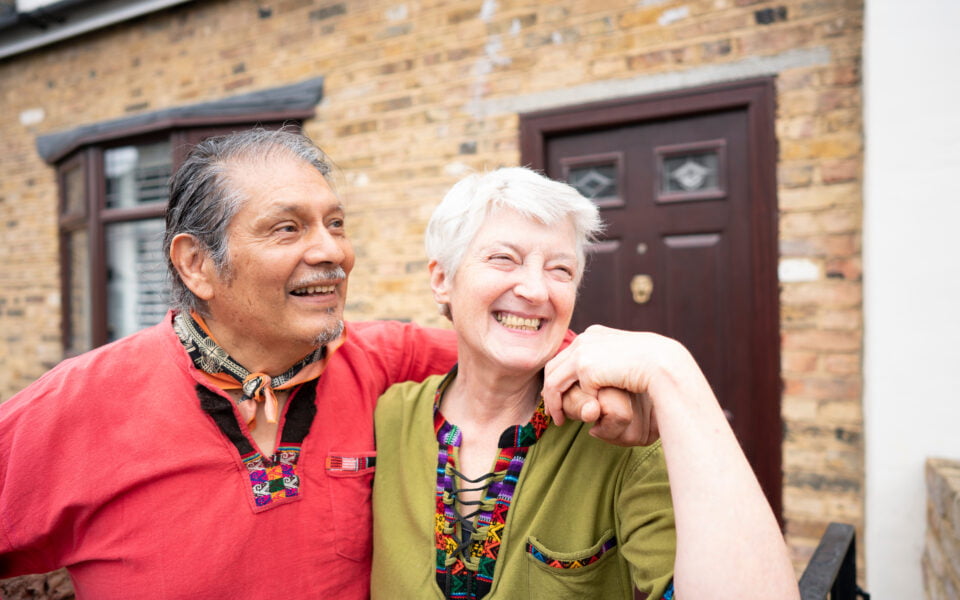Models of Work – Supporting people with drug and alcohol issues at Together
Service user leadership and valuing lived experience is a long-standing ethos of Together. As an organisation we consider all the factors that can impact the wellbeing of people who use our services. Issues with drugs and alcohol are one such important consideration.

Misuse and addiction to legal or illegal drugs, alcohol, or medication can negatively impact an individual’s mental health and wellbeing and people may seek support to cut down or stop using. At Together, we understand that drug or alcohol use has the potential to create or perpetuate experiences of mental distress, but that it also may be a way of managing wellbeing, including trauma or other difficult life experiences. Staff and volunteers across Together work alongside people that have been affected by these issues in many different ways and, in all cases, prioritise understanding each person’s own, unique, lived experience to ensure they provide support tailored to individual needs.
We work in partnership with specialist organisations such as Change Grow Live (CGL) or Turning Point, who provide a variety of treatment options. Multi-disciplinary and agency working is an integral way to ensure individuals access the support they need, as many people may need to have experienced mental distress in addition to issues with drug or alcohol use to be able to receive support.
Our accommodation services provide stable housing, and we recognise that this, alongside readily available mental health support helps people to change behaviours and to cut down or stop if desired.


Our advocacy services will always support and advocate on behalf of someone who is, or has, used drugs and / or alcohol. Our community services signpost people to drug and alcohol services and can link people to peers with similar experiences, to share coping strategies and provide understanding.
Our criminal justice team work with people whose offence may be related to issues with drugs or alcohol. Poor decision making whilst under the influence will be considered in the liaison and diversion work the team do when a person is awaiting sentence. Similarly, an important element of support provided within our criminal justice service is the work the team does with a person on probation, looking to reintegrate into society whilst managing issues with drugs or alcohol. This work is key in maintaining good mental wellbeing, avoiding the potential for reoffending and helping the person to secure housing, benefits and access to services.
Below you can see examples of how specific services at Together provide support to people affected by issues with drugs and / or alcohol.
Norfolk Integrated Housing and Community Support Service (NIHCSS) Specialist Housing Related Support
 The NIHCSS Specialist Housing Related Support is a recovery focused service for adults aged 18 + who are engaged in structured treatment for drug issues with CGL, and who have a housing need. That can be either individual or shared houses and includes those living with their family or friends (sofa surfing), in hostels, supported housing or who are street homeless.
The NIHCSS Specialist Housing Related Support is a recovery focused service for adults aged 18 + who are engaged in structured treatment for drug issues with CGL, and who have a housing need. That can be either individual or shared houses and includes those living with their family or friends (sofa surfing), in hostels, supported housing or who are street homeless.
The service supports people to keep engaged with alcohol and drug treatment, whilst addressing other factors important in maintaining positive wellbeing, for example financial support.
Here is an example of how we have supported a person experiencing drug issues. For this story the name has been changed to provide anonymity to the person who used the service
Helping a person distance themselves from damaging and dangerous circumstances
The NIHCSS Specialist Housing Related Support can help people to move away from situations and circumstances that can negatively impact their mental wellbeing or worsen issues they may have with addiction.
Kate was on a structured drug programme to help her stop using and had previously been in a relationship where there were threats of domestic violence. Kate had historically also been a victim of domestic abuse.
Kate was living in accommodation where people she had previously associated with when struggling with drug addiction were regularly interacting with her, asking for money and offering her drugs. Kate wanted to distance herself from this group and had sourced a new flat in a different area, but did not have the funds to pay for the rent deposit. This was because she was in the process of sorting out her own individual benefit claim as in the past her ex-partner had been claiming for them both.
NIHCCS Specialist Housing Related Support was able to secure the tenancy on the new property using the rent deposit scheme, which was paid out promptly within days of her request. Kate said she was so thankful for the service and felt she has been given a new start, explaining the new accommodation will have a beneficial effect on her mental health, as she was no longer isolated and anxious. None of the group she associated with previously knew the location of the new property and Kate therefore had the opportunity to start afresh with her recovery and options for the future.
Liaison and Diversion in Criminal Justice Settings
Together’s liaison and diversion services are designed to improve the health and justice outcomes for adults and children who come into contact with the youth and criminal justice systems. Individuals accessing this service can have a range of complex needs which may be factors contributing to their offending behaviour, including drug and alcohol issues.
Delivering against NHS England’s National Liaison and Diversion Operating Model, Together’s Liaison and Diversion Practitioners assess the needs of vulnerable individuals in magistrates’ courts across London. Here is an example of how the service supported a person struggling with drug use. The name of the person has been changed to provide anonymity.

Helping a person distance themselves from damaging and dangerous circumstances
The NIHCSS Specialist Housing Related Support can help people to move away from situations and circumstances that can negatively impact their mental wellbeing or worsen issues they may have with addiction.
Kate was on a structured drug programme to help her stop using and had previously been in a relationship where there were threats of domestic violence. Kate had historically also been a victim of domestic abuse.
Kate was living in accommodation where people she had previously associated with when struggling with drug addiction were regularly interacting with her, asking for money and offering her drugs. Kate wanted to distance herself from this group and had sourced a new flat in a different area, but did not have the funds to pay for the rent deposit. This was because she was in the process of sorting out her own individual benefit claim as in the past her ex-partner had been claiming for them both.
NIHCCS Specialist Housing Related Support was able to secure the tenancy on the new property using the rent deposit scheme, which was paid out promptly within days of her request. Kate said she was so thankful for the service and felt she has been given a new start, explaining the new accommodation will have a beneficial effect on her mental health, as she was no longer isolated and anxious. None of the group she associated with previously knew the location of the new property and Kate therefore had the opportunity to start afresh with her recovery and options for the future.
Liaison and Diversion in Criminal Justice Settings
Together’s liaison and diversion services are designed to improve the health and justice outcomes for adults and children who come into contact with the youth and criminal justice systems. Individuals accessing this service can have a range of complex needs which may be factors contributing to their offending behaviour, including drug and alcohol issues.
Delivering against NHS England’s National Liaison and Diversion Operating Model, Together’s Liaison and Diversion Practitioners assess the needs of vulnerable individuals in magistrates’ courts across London. Here is an example of how the service supported a person struggling with drug use. The name of the person has been changed to provide anonymity.


Norfolk Smoking Cessation in Severe Mental Illness Service
The Norfolk Smoking Cessation in Severe Mental Illness Service (SMI) is is run in partnership with Together for Mental Wellbeing and Reed Wellbeing and supports people who experience complex mental distress to quit smoking. The service works with all Primary Care Networks (PCNs) across the county of Norfolk. SMI includes schizophrenia, bipolar disorder, other psychoses and severe depressive disorders. People who experience these difficulties are often heavy smokers.
Tobacco smoking is a leading reason that people with SMI have a 10-25 year lower life expectancy when compared to the general population. There is extensive high-quality evidence for smoking cessation interventions including pharmacotherapy alone or in combination with behavioural support or e-cigarettes for the general population. Research has demonstrated that quitting smoking can improve mental health symptoms but that people with SMI may need extra support to quit, perhaps because they experience multiple additional barriers.
The local PCNs determine the areas in which support will be provided, with a particular focus on places with high levels of neighbourhood deprivation and a high prevalence of people with an SMI diagnosis who smoke. The service meets the needs of people with SMI who smoke by running pre-quit support sessions, providing people with the option of cutting down rather than quitting, and offering home visits.
Feedback from people who used the Norfolk Smoking Cessation in Severe Mental Illness Service
Jane’s Story
“If I was giving advice to people looking to reduce the amount they smoked I would tell them the truth, it is hard, but if you hang in there with all the support you get you will come out the other end. You need the support, if you try to do it by yourself it won’t work, especially if you are a heavy smoker. People living with mental illness need extra encouragement and support to quit smoking. The help from the Enhanced service helped with my wellbeing too.
I would recommend people get a carbon monoxide reading done too, it will make them realise the big difference. Plus, I’ve saved a lot of money from not smoking!”
Ron’s Story
“I got referred to the NHS Norfolk & Suffolk Recovery College which has helped me focus on feeling well. I couldn’t ask for a more supportive and caring Wellbeing Mentor, I feel extremely lucky to have this support. Plus, the information I’ve been given has been very insightful and gives more incentive to stop smoking.
Thank you, Smokefree Norfolk Enhanced Service. My Wellbeing has definitely improved!”




